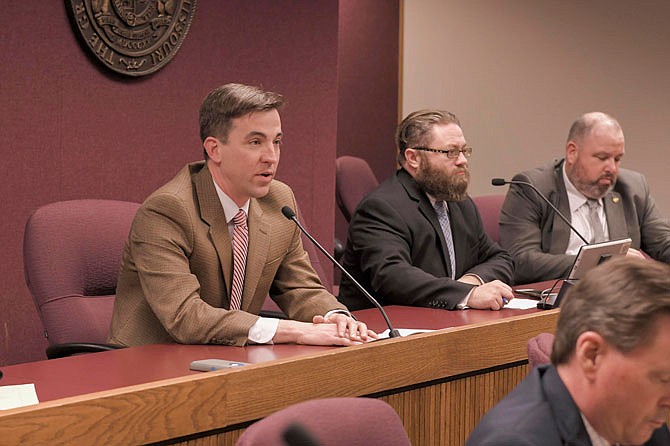State Rep. Jay Barnes has filed a formal complaint with the Missouri Ethics Commission about former Gov. Eric Greitens' campaign and the group "A New Missouri Inc.," which was formed last year to support Greitens and promote his agenda.
Barnes' complaint argued the now-former governor and A New Missouri violated the campaign finance limits voters adopted when they passed Amendment 2 on Nov. 8, 2016 - the same election where Greitens won the governor's office.
Greitens resigned June 1, and Mike Parson became governor.
Barnes, R-Jefferson City, submitted the complaint as chairman of the House Special Investigative Committee on Oversight, or SICO, that Speaker Todd Richardson formed in February to investigate Greitens' legal situation.
Barnes on Tuesday declined to comment about the complaint, saying its words provided all the information needed for this story.
Two Democrat members of the special House committee released the complaint to the media, and said in a Tuesday news release: "The disgraced former governor and his henchmen cannot be allowed to escape accountability for their alleged illegal actions."
The news release was signed by Assistant House Minority Leader Gina Mitten, D-Richmond Heights, and Rep. Tommie Pierson Jr., D-St. Louis.
"With the ethics complaint that has been filed, based on the work of the House investigative committee, the Missouri Ethics Commission has overwhelming evidence to conclude that Eric Greitens, his campaign committee and affiliated dark money organization broke state campaign finance laws," Mitten and Pierson added.
"After it reviews that evidence, we are confident the commission will determine that punishment against Greitens and his associates is warranted under the law."
"Dark money" involves donations from people whose identities are concealed from the public.
The 25-page complaint provided details of numerous emails among people working for A New Missouri, for the Greitens for Missouri campaign committee as well as consultants and potential donors.
The complaint noted Greitens "began taking actions in 2014 to run for governor," including a Jan. 29, 2014, meeting "with political advisers, including Michael Hafner, about a future campaign."
The complaint to the Ethics Commission cited dates for meetings, conversations or trips where campaign donations were discussed.
It reported Greitens didn't form a campaign committee until Feb. 24, 2015 - "nearly an entire year after Greitens had taken actions sufficient to trigger the reporting requirement."
Among the complaint's allegations, Barnes wrote: "Eric Greitens' obligation to form a candidate committee was triggered on or before March 12, 2014, when he traveled to California for meetings with potential donors who, in fact, became some of his earliest and most generous supporters.
"In December 2014, Greitens' political consultant, Michael Hafner, called MEC and advised Greitens to form a committee. However, Greitens purposefully failed to do so."
The complaint argued the "reason for Greitens' delay was strategic. As his other political adviser, Danny Laub, put it, 'the later the better.'"
Although no campaign limits were in effect during the 2016 elections, Barnes' complaint noted, state law prohibited any contributions "in the name of another person, or by or through another person in such a manner as to conceal the identity of the actual source of the contribution or the actual recipient and purpose of the expenditure."
But, the complaint said, the Greitens for Missouri campaign committee violated that law "by accepting donations from SEALs for Truth, which, in turn, received all of its funds from American Policy Coalition, Inc., a (federal) 501(c)(4) (organization) that did not disclose its donors and for which there is no evidence of any purpose other than funneling donations to SEALs for Truth and then (to) Greitens for Missouri."
Barnes said: "Greitens for Missouri's scheme to funnel money through SEALs for Truth was done 'in such a manner as to conceal the identity of the actual source of the contribution[s].'"
And, Barnes told the Ethics Commission: "Documents obtained by the House (special committee) reveal that Greitens for Missouri discussed funneling donations of politically problematic donors through (c)(4)'s to conceal their (donors') identity."
In addition, the complaint said, on several occasions the Greitens for Missouri campaign failed to report sizable donations as "in-kind" contributions to the campaign.
After voters approved new campaign limits of $2,600 per person, per election, the complaint said: "The principals of Greitens for Missouri set up A New Missouri Inc. for the purpose of evading the newly-enacted campaign finance laws in Amendment 2," and A New Missouri was created "as an entity through which to direct over-the-limit contributions to Greitens for Missouri."
The complaint said the "plain language of the Missouri Constitution" as well as state law and a 2018 Ethics Commission Advisory Opinion require A New Missouri to "register with the MEC and file reports. However, it has failed to do so."
In a telephone interview, Mitten - who is an attorney - told the News Tribune that Missourians who supported Amendment 2 should urge Attorney General Josh Hawley to pursue a separate investigation into the Greitens campaign and A New Missouri.
"Anyone who voted 'yes' on Amendment 2 in November 2016 indicated that they care about this - that they care about shenanigans in campaign finance (and) about following the law in campaign finance," she explained. "It seems to me that he owes Missourians who supported Amendment 2 an explanation as to what he's doing to enforce that law."
Hawley spokeswoman Mary Compton said: "We will carefully review any evidence to determine whether the (attorney general's office) possesses jurisdiction, and if we do not, will refer that evidence to the appropriate agency.
"This office has consistently followed this policy and has provided important evidence to a number of investigations including that of the House Investigative Committee, which relied heavily upon evidence provided by our Office in its report regarding misconduct by the Greitens Administration."

